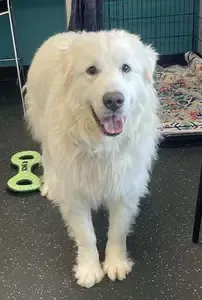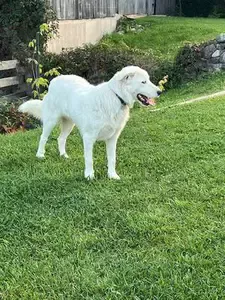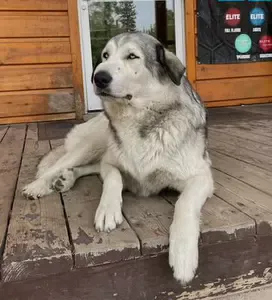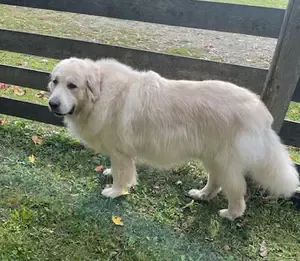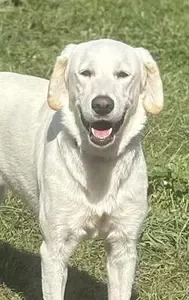Aggression, wandering, and neuter
by Betsey
(Colorado, USA)

My Dewa was leaving my house on a leash this morning just when I stranger was walking past. He broke loose, charged and then jumped up on the stranger, literally barking and snarling in her face. My friend, who was taking Dewa out for a walk, ran to the scene. He managed to get between the stranger and Dewa, and used waved his arms using body-language to say "down". Dewa calmed and meekly walked, with his head down, to my friend.
The stranger was emotionally shaken but physically unharmed.
This incident has me extremely concerned. Dewa will be 24 months on September 17 of this year. Due to the pandemic I was not able to socialize him during the critical age period. He has not demonstrated this level of aggression previously. He tends to charge right up to strangers (if he breaks loose or is in wilderness area off leash) but decides upon a sniff and the stranger's reaction whether he likes them, or not. Accordingly, he schmoozes up for a pet, barks a foot away, or moves away to distance pacing and looking on suspciously.
I think his behaviors are about defending his territory (which he thinks is well beyond my fence), protecting me, and defending his female litter mate.
He has also become fearful of the staircases in my home and I wonder if his aggression this morning and his staircase fears are related?
I am also noticing Dewa's increased desire to roam, whether via escape or deciding that sticking within a reasonable distance of me while we are walking wilderness together is no longer important. He's been so lovely up to about 1 month ago, recalling within 20 minutes while we have walked the National Forest lands together. What was previously a 60-80 minute walk/hike for me with Dewa and his sister, Samadhhi, is now often Dewa taking off, Samadhi in tow, and somedays running for HOURS (anywhere from 2-24) while I wait for them to return to the car. They have tracking collars now, so I know where and how far they are going but the distance and terrain is not accessible for me. They get leash walks in evenings everyday too but leash walks and yard play does not seem like enough exercise.
Please help me weigh the pros/cons of neutering him now, 3 months before his 2-year birthday. As well, full spay his sister Samadhi, who currently has partial spay. She does come into heat and perhaps spaying her will reduce Dewa's urge to defend her, as well to reduce coyote attraction to her.
Also, please help me weigh the pros/cons of walking off-leash in wilderness. My intention with these two was for my companionship and safety for hiking and rural homelife.
Comments for Aggression, wandering, and neuter
|
||
|
||
|
||
Breaking News
-
Flocon
Feb 22, 26 05:13 PM
DOB: Approx. Jan. 26, 2025 (don’t know for sure) rescued Jan. 2026 Location: Acton, Ontario Maybe this is the boy with whom you an enjoy your life. -
Bo
Feb 10, 26 11:36 AM
DOB: late Sept 2023 (don’t know for sure) rescued Dec 2023 Location: Acton, Ontario Name: Bo Single dwelling home with a securely fenced yard of at -
Courtesy Post - Sarge
Jan 20, 26 01:13 PM
*STAYING IN THE FAMILY* Courtesy Post - Sarge Location: Mount Albert, Ontario DoB: Unknown 2023 Required: He is comfortable around livestock, but -
Hardy
Dec 26, 25 06:23 PM
Hardy Location: Acton, ON DOB: Approx. January 2025 (we think he is older though) Single-family home required. Minimum 5-foot securely fenced yard. -
Ronnie
Nov 22, 25 06:20 AM
*Adopted* Location: Acton, ON DOB: 9-years-old This big sweetheart went to foster and was soon adopted before we got him posted. From the shelter: -
Lola
Nov 19, 25 12:01 PM
*ADOPTED* A single family dwelling and a securely fenced yard of at least 5 feet are musts. DOB approx: Februay 12, 2021 Location: Acton, Ontario This -
Mayne
Nov 07, 25 04:04 PM
*ADOPTED* (FOSTER FAIL) Mayne Location: Acton, ON DOB: August 5, 2017 (8-years-old) Single-family home required. Minimum 5-foot securely fenced yard. -
Courtesy Post - Remi
Oct 17, 25 11:09 AM
*ADOPTED* Remi (Retriever/Pyr cross) D.o.B: Sept. 30, 2023 Location: Between Owen Sound and Port Elgin (Tara, ON) Remi was given up because of health








